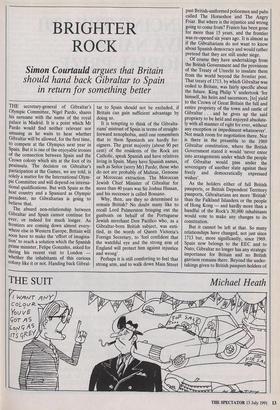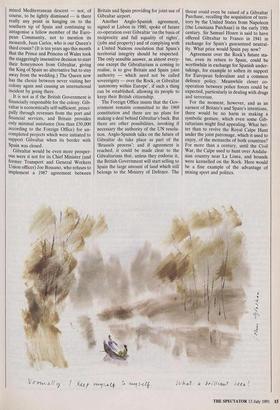BRIGHTER ROCK
should hand back Gibraltar to Spain in return for something better
THE secretary-general of Gibraltar's Olympic Committee, Nigel Pardo, shares his surname with the name of the royal palace in Madrid. It is a point which Mr Pardo would find neither relevant nor amusing as he waits to hear whether Gibraltar will be allowed, for the first time, to compete at the Olympics next year in Spain. But it is one of the enjoyable ironies of the connection between Spain and the Crown colony which sits at the foot of its Peninsula. The decision on Gibraltar's participation at the Games, we are told, is solely a matter for the International Olym- pic Committee and will depend on interna- tional qualifications. But with Spain as the host country and a Spaniard as Olympic president, no Gibraltarian is going to believe that.
The absurd non-relationship between Gibraltar and Spain cannot continue for ever, or indeed for much longer. As frontiers are coming down almost every- where else in Western Europe, Britain will soon have to make the 'effort of imagina- tion' to reach a solution which the Spanish Prime minister, Felipe Gonzales, asked for during his recent visit to London whether the inhabitants of this curious colony like it or not. Handing back Gibral- tar to Spain should not be excluded, if Britain can gain sufficient advantage by doing so.
It is tempting to think of the Gibralta- rians' mistrust of Spain in terms of straight- forward xenophobia, until one remembers that to them Spaniards are hardly for- eigners. The great majority (about 90 per cent) of the residents of the Rock are Catholic, speak Spanish and have relatives living in Spain. Many have Spanish names, such as Senor (sorry Mr) Pardo; those who do not are probably of Maltese, Genoese or Moroccan extraction. The Moroccan Jewish Chief Minister of Gibraltar for more than 40 years was Sir Joshua Hassan, and his successor is called Bossano.
Why, then, are they so determined to remain British? No doubt many like to recall Lord Palmerston bringing out the gunboats on behalf of the Portuguese Jewish merchant Don Pacifico who, as a Gibraltar-born British subject, was enti- tled, in the words of Queen Victoria's Foreign Secretary, to 'feel confident that the watchful eye and the strong arm of England will protect him against injustice and wrong'. Perhaps it is still comforting to feel that strong arm, and to walk down Main Street past British-uniformed policemen and pubs called The Horseshoe and The Angry Friar. But where is the injustice and wrong going to come from? Franco has been gone for more than 15 years, and the frontier was re-opened six years ago. It is almost as if the Gibraltarians do not want to know about Spanish democracy and would rather pretend that they are still under siege.
Of course they have undertakings from the British Government and the provisions of the Treaty of Utrecht to insulate them from the world beyond the frontier post. That treaty of 1713, by which Gibraltar was ceded to Britain, was fairly specific about the future. King Philip V undertook 'for himself, his heirs and successors, [to] yield to the Crown of Great Britain the full and entire propriety of the town and castle of Gibraltar . . . and he gives up the said propriety to be held and enjoyed absolute- ly with all manner of right for ever, without any exception or impediment whatsoever'. Not much room for negotiation there. Nor is there in the preamble to the 1969 Gibraltar constitution, where the British Government stated it would 'never enter into arrangements under which the people of Gibraltar would pass under the sovereignty of another state against their freely and democratically expressed wishes'.
As the holders either of full British passports, or British Dependent Territory passports, Gibraltarians are more 'British' than the Falkland Islanders or the people of Hong Kong — and hardly more than a handful of the Rock's 30,000 inhabitants would vote to make any changes to its constitution.
But it cannot be left at that. So many relationships have changed, not just since 1713 but, more significantly, since 1969. Spain now belongs to the EEC and to Nato; Gibraltar no longer has any strategic' importance for Britain and no British garrison remains there. Beyond the under- takings given to British passport-holders of mixed Mediterranean descent — not, of course, to be lightly dismissed — is there really any point in hanging on to the southern tip of Spain and continuing to antagonise a fellow member of the Euro- pean Community, not to mention its monarch, Juan Carlos, who is our Queen's third cousin? (It is ten years ago this month that the Prince and Princess of Wales took the staggeringly insensitive decision to start their honeymoon from Gibraltar, giving the King of Spain no alternative but to stay away from the wedding.) The Queen now has the choice between never visiting her colony again and causing an international incident by going there.
It is not as if the British Government is financially responsible for the colony. Gib- raltar is economically self-sufficient, princi- pally through revenues from the port and financial services, and Britain provides only minimal assistance (less than £50,000 according to the Foreign Office) for un- completed projects which were initiated to support Gibraltar when its border with Spain was closed.
Gibraltar would be even more prosper- ous were it not for its Chief Minister (and former Transport and General Workers Union officer) Joe Bossano, who refuses to implement a 1987 agreement between Britain and Spain providing for joint use of Gibraltar airport.
Another Anglo-Spanish agreement, signed at Lisbon in 1980, spoke of future co-operation over Gibraltar 'on the basis of reciprocity and full equality of rights', (jobs and property) and of complying with a United Nations resolution that Spain's territorial integrity should be respected. The only sensible answer, as almost every- one except the Gibraltarians is coming to realise, is to give Britain and Spain joint authority — which need not be called sovereignty — over the Rock, or Gibraltar 'autonomy within Europe', if such a thing can be established, allowing its people to keep their British citizenship.
The Foreign Office insists that the Gov- ernment remains committed to the 1969 constitution and there are no plans for making a deal behind Gibraltar's back. But there are other possibilities, invoking if necessary the authority of the UN resolu- tion. Anglo-Spanish talks on the future of Gibraltar do take place as part of the 'Brussels process'; and if agreement is reached, it could be made clear to the Gibraltarians that, unless they endorse it, the British Government will start selling to Spain the large amount of land which still belongs to the Ministry of Defence. The threat could even be raised of a Gibraltar Purchase, recalling the acquisition of terri- tory by the United States from Napoleon (the Louisiana Purchase) in the early 19th century. Sir Samuel Hoare is said to have offered Gibraltar to Franco in 1941 in exchange for Spain's guaranteed neutral- ity. What price would Spain pay now?
Agreement over the Rock's future sta- tus, even its return to Spain, could be worthwhile in exchange for Spanish under- takings, for example to soften its support for European federalism and a common defence policy. Meanwhile closer co- operation between police forces could be expected, particularly in dealing with drugs and terrorism.
For the moment, however, and as an earnest of Britain's and Spain's intentions, there would be no harm in making a symbolic gesture, which even some Gib- raltarians might find appealing. What bet- ter than to revive the Royal Calpe Hunt under the joint patronage, which it used to enjoy, of the monarchs of both countries? For more than a century, until the Civil War, the Calpe used to hunt over Andalu- sian country near La Linea, and hounds were kennelled on the Rock. Here would be a fine example of the advantage of mixing sport and politics.



















































 Previous page
Previous page